April 30 is National Oatmeal Cookie Day
National Raisin Day
Hairstyle Appreciation Day
National Honesty Day
Walpurgis Night, an ancient festival to ward off witches, warlocks, and demons observed in the towns of the Harz Mountains of Germany and in Finland and the Scandinavian countries.
In the year 311, the Diocletianic (named after Emperor Diocletian) Persecution of Christians in the Roman Empire ended.
1598 – Juan Oñate made a formal declaration of his Conquest of New Mexico.
On the balcony of Federal Hall on Wall Street in New York City, George Washington took the oath of office to become the first elected President of the United States on April 30, 1789.
April 30, 1803 – The United States purchased the Louisiana territory from France.
 Louisiana Admission Day on April 30, 1812, eighteenth state
Louisiana Admission Day on April 30, 1812, eighteenth state
- Capital: Baton Rouge
- Nickname: Pelican State
- Bird: Eastern brown pelican
- Flower: Magnolia
- Tree: Bald Cypress
- Motto: Union, justice, and confidence
See our page for Louisiana for more interesting facts and trivia about Louisiana
1871 – The Camp Grant Massacre took place in Arizona Territory. 148 Arizonans — comprised of six Anglos, 94 San Xavier Papagos and 48 Mexicans slaughtered eight men and 110 women and children. In addition, 28 Camp Grant papoose were kidnapped for sale in the child slave trade.
In December, 1871, 104 posse members were indicted and brought to trial in Tucson, Judge John Titus presiding. The trial was more of a formality to appease the federal government and sympathetic easterners. On the western frontier, it was impossible to convict anyone for murdering Apaches. Thus after five days of trial and 19 minutes of jury deliberation, the verdict was pronounced by the jury foreman, John B. Allen, “Not Guilty!” The 104 accused were exonerated.Details from Desert Magazine.
1885 – Governor of New York, David B. Hill signed legislation creating the Niagara Reservation, New York’s first state park, ensuring that Niagara Falls will not be devoted solely to industrial and commercial use.
1894 – Coxey’s Army reached Washington, D.C. to protest the unemployment caused by the Panic of 1893.
1900 – Hawaii became a territory of the United States.
1900 – Casey Jones died in a train wreck in Vaughan, Mississippi, while trying to make up time on the Cannonball Express.
1904 – The Louisiana Purchase Exposition World’s Fair opens in St. Louis, Missouri. Setting for the movie “Meet Me In St. Louis”.
April 30, 1945 – Adolf Hitler committed suicide on the same day that the Soviet Army raised the Red Flag on Berlin’s Reichstag.
 1947 – In Nevada, the Boulder Dam was renamed the Hoover Dam a second time.
1947 – In Nevada, the Boulder Dam was renamed the Hoover Dam a second time.
The site of the dam is Black Canyon or Boulder Canyon. The building of the dam was authorized in 1928 and was generally referred to as the “Boulder Canyon Project”. No name for the dam was mentioned in the congressional authorization.
In a speech at the ceremony which began the building of a railroad connection between Las Vegas, Nevada and the dam site, Secretary of the Interior, Ray Wilbur called it Hoover Dam in honor of the sitting president.
Following Roosevelt’s election, his Secretary of the Interior, Harold Ickes, ordered that the dam be referred to as “Boulder Dam” and at the dedication ceremony on Sept 30, 1935 he spoke the name “Boulder Dam’ at least five times within thirty seconds.
The name failed to take hold and, with the passage of time, the memories of the Great Depression faded. In 1947 a bill passed both Houses of Congress unanimously restoring the name “Hoover Dam”.
Organization of American States charter signed at Bogota, Colombia on April 30, 1948.
The Diary of Anne Frank was published in English on this date in 1952.
On April 30, 1975, the Vietnam War ended, as North Vietnamese forces take Saigon.
April 30, 1980 – Queen Juliana of the Netherlands abdicated the throne, and her daughter becomes Queen Beatrix of the Netherlands. Beatrix later also abdicated, on this day in 2013, in favor of her son, King Willem-Alexander of the Netherlands.
 1987 Bill Elliott set the all-time speed record of 212.8 mph at Talladega Speedway during qualifying for the race to be run on May 3, 1987.
1987 Bill Elliott set the all-time speed record of 212.8 mph at Talladega Speedway during qualifying for the race to be run on May 3, 1987.
CERN announces in 1993 that the World Wide Web protocols will be free.

 Eeyore’s Birthday – (Eeyore is a character in the Winnie-the-Pooh books by A. A. Milne. He is generally characterized as a pessimistic, gloomy, depressed, anhedonic [not able to feel pleasure], old grey stuffed donkey who is a friend of the title character, Winnie-the-Pooh.)
Eeyore’s Birthday – (Eeyore is a character in the Winnie-the-Pooh books by A. A. Milne. He is generally characterized as a pessimistic, gloomy, depressed, anhedonic [not able to feel pleasure], old grey stuffed donkey who is a friend of the title character, Winnie-the-Pooh.)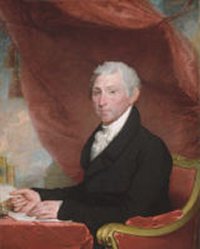 Birthday of
Birthday of 
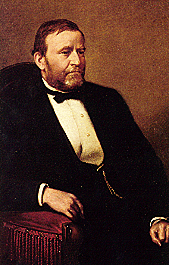 Birthday of
Birthday of 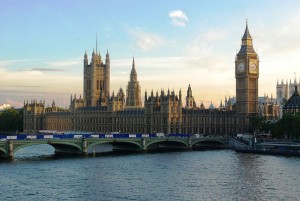 On April 27, 1840, the foundation stone for new Palace of Westminster, London, was laid by wife of Sir Charles Barry.
On April 27, 1840, the foundation stone for new Palace of Westminster, London, was laid by wife of Sir Charles Barry.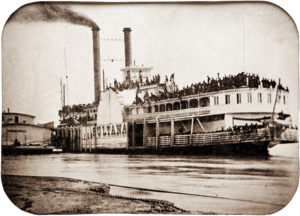 On April 27, 1865, the steamboat
On April 27, 1865, the steamboat 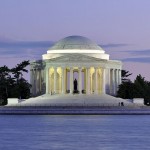 Birthday of John Russell Pope (1874), American architect whose work includes the National Gallery of Art and the Jefferson Memorial
Birthday of John Russell Pope (1874), American architect whose work includes the National Gallery of Art and the Jefferson Memorial 1913 – The Woolworth Building skyscraper in New York City was opened. It was the tallest building in the world from 1913 to 1930 at 792 feet tall with 57 stories.
1913 – The Woolworth Building skyscraper in New York City was opened. It was the tallest building in the world from 1913 to 1930 at 792 feet tall with 57 stories.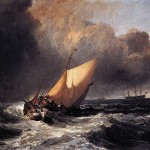
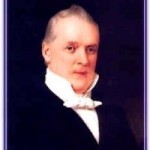 Birthday of
Birthday of 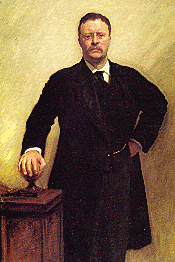 1910 –
1910 – 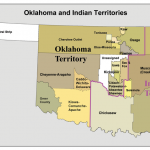 Oklahoma Day celebrating the anniversary of the opening of the Oklahoma Territory for settlement in 1889.
Oklahoma Day celebrating the anniversary of the opening of the Oklahoma Territory for settlement in 1889. 1915 – The New York Yankees wore pinstripes and the hat-in-the-ring logo for the first time.
1915 – The New York Yankees wore pinstripes and the hat-in-the-ring logo for the first time.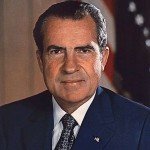 April 22, 1994: Death of
April 22, 1994: Death of 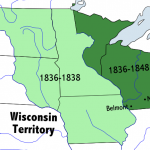 U.S. Congress passed an act creating the
U.S. Congress passed an act creating the 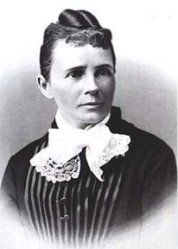 Birthday of Lucretia Garfield (April 19, 1832), wife of
Birthday of Lucretia Garfield (April 19, 1832), wife of  April 15, 1452 was the birthday of Leonardo da Vinci, (Leonardo di ser Piero da Vinci), Italian Renaissance polymath: painter, sculptor, architect, musician, mathematician, engineer, inventor, etc.
April 15, 1452 was the birthday of Leonardo da Vinci, (Leonardo di ser Piero da Vinci), Italian Renaissance polymath: painter, sculptor, architect, musician, mathematician, engineer, inventor, etc. 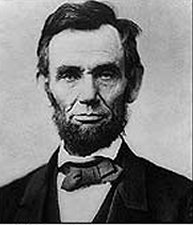 1865 – Death of
1865 – Death of 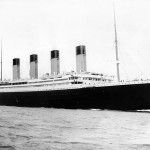 1912 – The British passenger liner RMS Titanic hit an iceberg in the North Atlantic at 23:40 (sank morning of April 15th). Titanic had an estimated 2,224 people on board; more than 1500 of them died. In accordance with existing practice, Titanic’s lifeboat system was designed to ferry passengers to nearby rescue vessels, not to hold everyone on board simultaneously.
1912 – The British passenger liner RMS Titanic hit an iceberg in the North Atlantic at 23:40 (sank morning of April 15th). Titanic had an estimated 2,224 people on board; more than 1500 of them died. In accordance with existing practice, Titanic’s lifeboat system was designed to ferry passengers to nearby rescue vessels, not to hold everyone on board simultaneously.